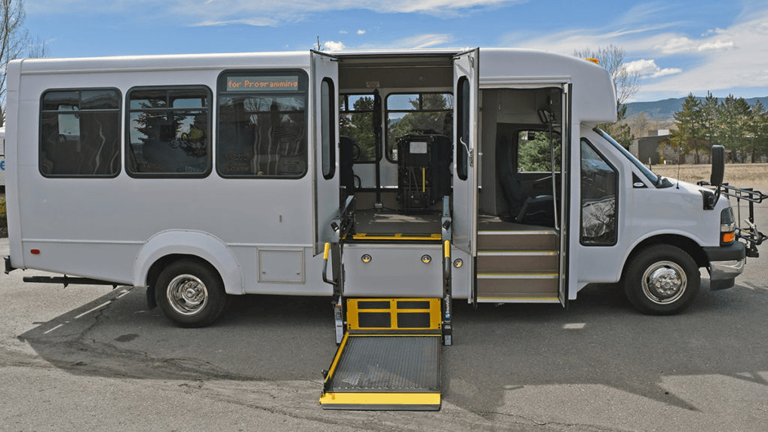Securing contracts with local school districts, city, state, and federal governments can be a lucrative and stable source of revenue for transportation companies. This article explores the various opportunities and considerations for contracting with government entities, focusing on passenger transportation, logistics, and fleet management.

1. Passenger Transportation
School District Contracts Transporting students is a critical service provided by transportation companies to local school districts. Key considerations include:
– Safety and Compliance: Ensuring that all vehicles meet safety standards and drivers are properly trained and vetted.
– Reliability: Maintaining a dependable schedule to ensure timely pick-up and drop-off of students.
– Special Needs Transportation:Providing services for students with disabilities, which may require specialized vehicles and training. Contracts with school districts often involve detailed bidding processes and compliance with specific regulatory requirements. Establishing a strong reputation for safety and reliability can significantly enhance a company’s chances of securing these contracts.
City and State Public Transportation Cities and states contract with transportation companies to provide public transit services such as buses, shuttles, and paratransit. Key elements include:
– Efficiency: Optimizing routes and schedules to meet the needs of the public while minimizing operational costs.
– Accessibility: Ensuring services are accessible to all residents, including those with disabilities.
– Sustainability: Incorporating eco-friendly vehicles and practices to align with environmental goals. Winning these contracts often requires demonstrating the ability to manage large fleets, integrate with existing transit systems, and provide reliable service to a diverse population.
2. Logistics
Local and State Government Contracts Local and state governments require logistics services for a variety of purposes, including the transportation of goods and materials for public works, emergency services, and other municipal needs. Considerations include:
– Timeliness: Ensuring prompt delivery of goods to support government operations and services.
– Cost-Effectiveness:** Providing competitive pricing while maintaining high service standards.
– Flexibility: Adapting to changing requirements and schedules. Securing these contracts often involves a thorough understanding of government procurement processes and the ability to meet stringent requirements.
Federal Government Contracts Federal government contracts can be particularly lucrative but also come with higher levels of scrutiny and complexity. Key areas include:
– Regulatory Compliance: Adhering to federal regulations, including security clearances and compliance with the Federal Acquisition Regulation (FAR).
– Advanced Logistics Solutions: Providing sophisticated logistics solutions for agencies like the Department of Defense, FEMA, and the USPS.
– Scalability: Demonstrating the ability to scale operations to meet the demands of large and diverse projects. Federal contracts often require a detailed proposal process, including the submission of past performance records and financial stability documentation.

3. Fleet Management
Municipal Fleet Management Cities and municipalities often outsource fleet management for their vehicles, including police cars, fire trucks, public works vehicles, and more. Key aspects include: – Maintenance and Repair: Ensuring that all vehicles are maintained in optimal condition to reduce downtime and extend vehicle lifespans.
– Fuel Management: Implementing efficient fuel management practices to control costs.
– Technology Integration: Utilizing telematics and fleet management software to track vehicle usage, maintenance schedules, and driver performance. Securing these contracts typically involves demonstrating expertise in managing large and diverse fleets, along with a proven track record of reducing operational costs and improving efficiency.
State and Federal Fleet Management State and federal agencies also contract out fleet management services. Considerations include:
– Comprehensive Management: Providing end-to-end fleet management services, from procurement and maintenance to disposal.
– Regulatory Adherence: Ensuring compliance with state and federal regulations regarding vehicle operations and emissions.
– Sustainability Initiatives: Incorporating green fleet management practices to support government sustainability goals. Winning these contracts often requires a detailed understanding of government requirements and the ability to offer innovative solutions that align with agency goals.
Conclusion: Contracting with local school districts, city, state, and federal governments offers substantial opportunities for transportation companies. Whether in passenger transportation, logistics, or fleet management, understanding the unique needs and regulatory requirements of these entities is crucial. By demonstrating reliability, efficiency, and compliance, transportation companies can secure and maintain lucrative government contracts, contributing to the efficient operation of public services and infrastructure.
References:
1. U.S. General Services Administration (GSA) – Federal Fleet Management Requirements
2. National Association of State Procurement Officials (NASPO) – State Procurement Practices
3. School Transportation News – Contracting with School Districts 4. American Public Transportation Association (APTA) – Public Transit Contracting Guidelines By leveraging expertise, technology, and a deep understanding of government procurement processes, transportation companies can position themselves as valuable partners to government entities at all levels.
Written By:
Tyra Jones, MBA/PA, EdD/ET